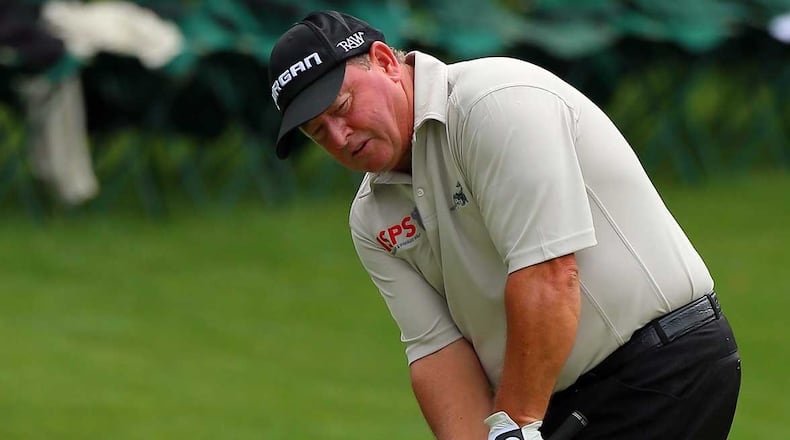So it was with some surprise to find Woosnam hard at it during a solo practice round at Augusta National on Tuesday morning. His 30-year bout with ankylosing spondylitis, a rheumatic disease that can cause his vertebrae to lock, is never-ending, and he thought it prudent to stop after nine holes. But he will play in his 29th Masters this week at at the insistence of a higher calling.
“Well, wife my told me I should,” the 1991 Masters champion said. “Got to listen to the boss.”
There is, of course, more to it. Woosnam, 59, hasn’t been relevant to the Masters since making his last cut in 2008, the same year as his last sub-par round. Defending champion Danny Willett was 3 when Woosnam outdueled Jose Maria Olazabal and Tom Watson for his only major championship 26 years ago.
Olazabal, 51, has fought his way back into the tournament this year after skipping last year because of injury. Watson played his last Masters last year. But Woosnam, having announced he was stepping away, had something of a revelation last October, when he was inducted into the World Golf Hall of Fame.
With 47 worldwide championships, he has won more titles than any male British golfer. He was awarded the OBE (Order of the British Empire) in 2007 when he captained the European Ryder Cup team to its most decisive victory ever over the U.S. He is not so much a relic as he is breathing piece of British history, and the net result “has given me a bit more enthusiasm to play,” he said after his induction.
Pausing Tuesday, he acknowledged this could be a short week. The challenging topography at Augusta National can strain the spines of a 20-year-old, much less a tottering 5-foot-4 Welshman who walks as if he is leaning into a stiff breeze.
“Just keep at it. See how it goes,” Woosnam said. “My wife (Glendryth) wasn’t too happy when I told her I wasn’t going to play anymore. And I think maybe it’s a good thing to keep playing for another couple of years.
“I’m not going to kill myself, trying to make a cut or anything. I’m going to go out and try to smell the flowers a little bit and try and enjoy it.”
And so he did Tuesday, walking over to the ropes when he recognized a familiar face, riffing on his own shots. When his tee shot on No. 8 drifted into the pine straw off the left rough, he turned and said, “That was up in the air a long time, wasn’t it?” There followed the respondent “Woooos,” from the fans, because — hey — it’s still a fun thing to say.
It wasn’t always such. In the years leading to Woosnam’s victory, foreign players won five of the previous eight Masters, a reality American fans were still struggling to accept. As Woosnam fought off Watson — he would double-bogey No. 18 to lose the championship by one stroke — the galleries weren’t exactly pro-Wales. When Woosnam sent a shot into the creek on No. 13, some fans cheered.
Glendryth Woosnam, the story goes, taped over her name on her credential to avoid being identified.
That was last century. Golf has long had a new order. Woosnam will spend two weeks in Georgia this visit, playing next weekend’s Mitsubishi Electric Classic at TPC Sugarloaf in Duluth. In the meantime, he will spend a little more time on a golf course he not so long ago said bye-bye to, Woosie still at the Masters.
“They have a very long memory here,” he said. “And they think fondly of their champions.”
About the Author
